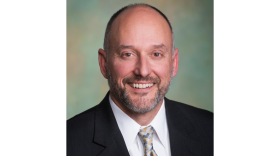Gov. Doug Burgum is proposing a nearly $5.9 billion state budget for the upcoming two year period.
That figure includes both state and federal dollars.
In his budget address to state lawmakers -- meeting in their organizational session -- Burgum advocated for his income tax relief plan. He said the plan will eliminate the state income tax for three out of five taxpayers, and those still paying the income tax will see their tax liability reduced by 25 to 50 percent.
"This allows North Dakotans to keep more of their hard earned money, to off-set the expenses they're seeing with inflation, and to invest in their families and their communities," Burgum said. "Every North Dakota income tax payer will benefit from this plan."
Burgum called that proposal "Relief for All." He said if passed, it would make North Dakota's rate the lowest flat-tax rate in the nation.
The Legislature is expected to look at proposals to grant property tax relief. Burgum said he is not in favor of using state dollars to pay down local property taxes.
"Are we for reducing the costs that drive up property taxes? Absolutely — let's dig in to the real drivers that raise property taxes," Burgum said. "But are we for subsidizing more local spending, by taking dollars from one set of taxpayers and sending them to property owners? We're not in favor of that."
The state already pays a large share of the costs of local schools.
Child Care and Workforce Shortage
Burgum is proposing a $167 million package to help address the workforce shortage.
One part of that package is addressing the need for people to find a child care.
"We know the lack of available, affordable and quality child care is key," Burgum said. "Not having that is a barrier to workforce participation."
Burgum said in a number of cases, parents have to choose between working and paying for child care, or not working at all. He said the cost of child care is often between 15 and 40 percent of the average household budget in North Dakota – which he says isn’t sustainable for young families. Burgum said the package includes $76 million to improve the availability, quality and affordability of child care.
State employee pay
Burgum outlined a pay plan to try and bring state workers’ salaries more in line with what the private sector is paying. He proposes a $90 million pay equity pool, as well as performance increases of 6 percent in the first year of the next biennium, and 4 percent in the second year.
"Those increases — 6 and 4 — represent an investment in the workforce of $211 million," Burgum said. "If we don't make that investment, we'll spend more than that on training, recruiting, and rehiring, as we lose the talent."
North Dakota United – which represents public employees, as well as teachers – called Burgum’s proposal a good start. President Nick Archuleta said the pay equity pool proposal is a good one.
"We all know what inflation is doing to families across the state," Archuleta said. "Over the course of several years, we have lost a number of public employees to the private sector, and positions have been eliminated, and those public employees who remain are working harder with less help."
Arhculeta said the group is happy that Burgum proposed a “6 and 4” package. However, he said his membership will be pushing lawmakers to approve an “eight and eight” plan.
Burgum is also proposing a three percent increase in the number of state employees.
Roads and bridges
Burgum is proposing what he called "unprecedented" spending on roads and bridges, as well as other infrastructure. He proposes to spend $2.4 billion over the two year period.
"This includes $1.2 billion in federal funds from the Infrastructure Investment and Jobs Act," Burgum said. "One billion will come from special funds, and $125 million as a one-time investment from the General Fund."
Burgum also proposes more than $600 million to be invested in water and flood control projects.
"When we have great road and water infrastructure, it makes it easy for the over $40 billion of new projects interested in North Dakota to come here," Burgum said.
The Legislature will take a more in-depth look at Burgum's budget when it meets in January.




